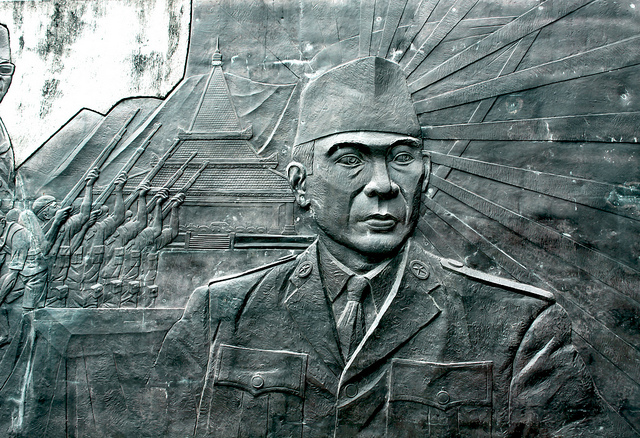
One issue, above all others, starkly differentiates the jobs of Indonesian President and Australian Prime Minister. When our Prime Minister wakes each morning, the first question she asks isn’t: “Do I still have a whole country to govern today?”
The challenge of maintaining national sovereignty and territorial integrity has beset incumbents of Jakarta’s presidential palace since the earliest days of the Indonesian republic. Not all Indonesians were as enthusiastic about a macro Indonesian state as the mostly Javanese and Sumatran nationalist leaders who declared and struggled for independence from 1945. Insurrection and separatism have been constant features of the Indonesian experience since the 1950s.
In the west of the archipelago, disaffected elements of the Indonesian Army formed an anti-Jakarta revolutionary government in Sumatra, which was quashed in 1957. Separate attempts to create an Islamic state in Aceh began in 1953, inflamed as much by oil and gas revenues as by religious zeal—it took the 2004 Boxing Day tsunami, and the persistence of former Vice President Jusuf Kalla, to bring a lasting peace with the Free Aceh Movement.
On Sulawesi, a brief, CIA-backed military rebellion in Manado was defeated in 1958, while communal conflict continues to erupt today around Poso, in the centre of the island. In West Java, the Darul Islam separatist movement expanded steadily in the 1950s to Sumatra, Sulawesi and Kalimantan, being finally brought under control in 1965.
To the east, sporadic fighting to form a breakaway Republic of South Maluku lasted from 1950 to 1963—a self-proclaimed government-in-exile still exists in the Netherlands. Further to the south, FALINTIL guerrillas fought for independence from the moment of Indonesia’s invasion of Timor-Leste in 1975 until the arrival of international troops 24 years later.
In the far eastern end of Indonesia, near its border with Papua New Guinea, the Free Papua Movement, or OPM, has been engaged in secessionist conflict since 1965. Hostilities continue today.
Keeping 250 million citizens, from over 300 ethnic groups, across thousands of islands stretching the distance from Sydney to Perth, aggregated into a single unitary state, still seems a tall order in 2013. But it works. And it’s in our vital national interest that it continues to work. We want our neighbour, the world’s fourth largest polity, to remain stable.
Our decision late last century in assisting East Timor’s independence from Indonesia was taken for all the right altruistic reasons. But the supervening consequences of East Timor still cast shadows over our relations with Indonesia. Our national self-interest was dealt a crushing body blow that we’re slowly recovering from. There’s nothing more sensitive or more sacred to Indonesians than their territorial integrity. In the popular and often-proclaimed phrase, Indonesian unity is considered harga mati – non-negotiable.
In the region around us, there could be only one thing worse for Australia than being viewed by a generation of our neighbours as a conspirator, complicit in the excision of East Timor from the map of Indonesia. And that’s if it happened again in Papua.
Among some observers and commentators, there’s a kind of bleak, almost fatalistic, anticipation that Indonesia is on track to repeat the same mistakes in its provinces of Papua and West Papua that led to overwhelming international support for East Timor’s separation. In the conventional wisdom, Papua will follow a similar path. This would be disastrous for Australia. And there’s a real danger this sense of inevitability could become self-fulfilling. Before that happens, we would do well to take stock of the situation and find ways to halt the runaway train that such thinking could create.
For starters, we need to give the elephant in the room a name and recognise the danger it poses. Yes, there’s risk involved in engaging with Indonesia on sensitive issues. But the risk of not doing so is greater, lest either side misread the interests and misjudge the intentions of the other. How much better to head off the strategic shock of policy failure in Papua, than trying to improvise when the problem becomes a crisis?
In most discussions between Australian and Indonesian officials, trespassing is forbidden on the subject of Papua and Indonesia’s poor handling until now of its social, political, security, economic and cultural challenges. Its sensitivity, especially in the light of the East Timor precedent, makes it a taboo topic. In the next part of this post, I’ll discuss the diplomatic challenges Australia has faced with Indonesia on Papua, point out the biggest hurdle both sides will need to clear in moving forward on the issue, and suggest why Papua isn’t necessarily the next East Timor.
Gary Hogan is a former Professor of Grand Strategy at the US National Defense University. He was the first foreigner to graduate from Indonesia’s Institute of National Governance (Lemhannas) and was Australia’s Defence Attaché to Indonesia 2009 to 2012. Image courtesy of Flickr user Alwita.

